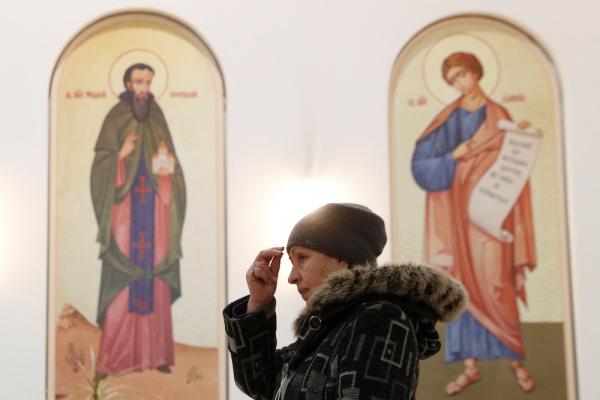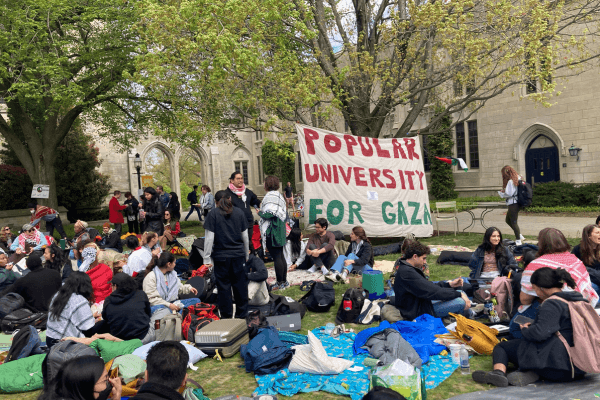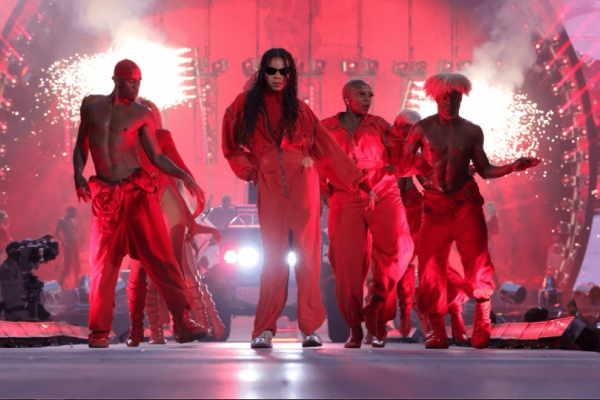The forces that incite and fuel war can feel inevitable. Though the Olympics are usually greeted by temporary truces and international peace building, this year's winter games take place as the Russian Federation amasses troops and military hardware along its border with Ukraine. U.S. military and intelligence assessments estimate that a conflict could result in as many as 50,000 Ukrainian civilian casualties and create up to 5 million refugees — all because of a power struggle between NATO, Europe, the United States, and Russia for dominance in the region and control over fuel supply chains. While the forces of imperialism seem inescapable, the role of the church is to show the way out.
Russian President Vladimir Putin has been incensed with Ukraine since 2014 when the Maidan Revolution ousted Putin’s hand-picked Ukrainian president Viktor Yanukovych and replaced the government with one interested in negotiating with Europe. Putin rallies his own base around a dream of restoring the Soviet empire — as his dominance in Belarus and the occupied territories of Crimea and Donbas demonstrate. Through Putin’s current aggressive moves on the Ukrainian border, he also seeks to sow divisions within NATO to weaken both the United States and the Western alliance; former U.S. President Donald Trump only helped the cause by repeatedly threatening to leave NATO during his administration. Putin views Ukraine’s desire to join NATO, which was initially formed to oppose the Soviet Union, as a threat and wants assurances from the West that this is off the table — assurances the U.S. and its allies in Western Europe have thus far been unwilling to provide.
While Ukraine and Russia both have state-sponsored Orthodox churches that are susceptible to partisan political conflict, many churches of all denominations at the local level are addressing the current crisis by expanding their social services. According to Major Archbishop Sviatoslav Shevchuk of the Ukrainian Greek Catholic Church, these churches are working to “supply food, warm clothes, and offer psychological assistance” to those in need. Catholic parishes and staff at Caritas, an international Catholic relief organization, are providing material, spiritual, and psychological aid along the conflict line. Shevchuk said that the priests and nuns will stay with their people whether or not there is an invasion. He hopes that, through these actions, the church can “say out loud ‘no’ to military action as a solution to problems” and rather promote dialogue, solidarity, and cooperation.
At the international level, we do see prospects for peace. David Cortright and George A. Lopez at Notre Dame’s Kroc Institute for International Peace Studies are cautiously optimistic about the mix of diplomacy and threats of more severe multilateral sanctions the United States and its allies have been pursuing for the past month. Working in concert with European allies, now is the time for the Biden administration to ramp up negotiations with Russia to de-escalate the crisis, which can include assurances to further demilitarize the region and even a commitment to delay future NATO expansion.
While it is impossible to fully predict Putin’s plans, we strongly believe that Christians must tap into our prophetic imagination to see a path toward peace rather than accept war as a foregone conclusion. Ukrainian Christians are modeling this prophetic imagination and courage: In response to a circulating theory that religious conflict in the region is a reason for Russia’s aggression, Shevchuk strongly reiterates that, though churches have different political views, people at the grassroots are united. Among Ukraine’s religious leaders, says Shevchuk, “it is very clear that religious peace is a matter of national security. So we are avoiding any kind of conflicts among us and we are trying to foster religious peace in Ukraine as much as possible.”
While the prophet Isaiah’s vision of nations beating swords into plowshares (Isaiah 2:4) may seem utopian, the presumption of peace is both a practical and moral imperative. We must channel that vision into advocacy for practical alternatives to conflict — including supporting spaces for Ukrainian civil society to express their views directly to policy makers; supporting ceasefires; protecting local communities in conflict through unarmed civilian protection (UCP); incorporating the training for unarmed civilian-based defense in Ukraine; limiting arms sales by supporting the Arms Trade Treaty that regulates international trade in conventional weapons; taking unprecedented steps toward renewable energy supplies and thus limiting the ways aggressors can hold access to fossil fuels captive; and taking steps toward nuclear disarmament through engaging the Treaty on the Prohibition of Nuclear Weapons.
Nonviolent tools can be effective in confronting aggression and preventing war. According to studies conducted by the International Center for Nonviolent Conflict, Ukrainians “show a surprising level of support for the type of resistance that neither Ukrainian policymakers nor their Western backers have considered in their defense planning: mass nonviolent resistance actions against a formidable military invader.” An unarmed civilian defense strategy can also divert a possible internal coup and the “emergence of a domestic military dictatorship—possibly closely allied with Russia—from overtaking the country's young democracy,” writes Maciej Bartkowski, senior advisor to the ICNC and a contributor to the Catholic Nonviolence Initiative. Civilian-based defense models have a long history in resisting aggression, as well as a modern history in the defense of states living along Russia’s borders. In 2016, the Lithuanian Ministry of Defense issued two preparedness manuals on the “modes and principles of civil resistance” as part of its national defense. Lithuania has entered into civil resistance agreements with neighbors Estonia and Latvia to broaden the strength of their civil defense.
The church and civil society have vital roles to play in resisting autocratic expansion — both in the United States and around the world. In response to Putin’s aggression and the West’s militarized response, on Jan. 27 Sojourners joined a range of denominations and faith-based partners in a statement calling on U.S. President Joe Biden and other political leaders to “do everything in their power to protect human lives and prevent war … Rather than relying on militaristic approaches, our leaders must invest in efforts to sustain peace and prevent harm to those who would suffer the most from the devastating and long-term impacts of conflict. Only by vigorously pursuing all avenues for peace can we fulfill our sacred duty to respect the equal dignity and worth of every person.”
Religious leaders in Ukraine are leading the way. Catholic Archbishop Visvaldas Kulbokas, Apostolic Nuncio to Ukraine, noted that amid armed military conflict and aggravated political stalemates with all parties protecting their own interests, the church has the role of praying and taking action for peace. We must also pray and act to help convert military and political leaders from the use of force to effective engagement for peace. Kulbokas reminds us of Jesus’ words to the one who cut off the high priest’s servant’s ear, asking him to put his sword back into its sheath.
Got something to say about what you're reading? We value your feedback!









